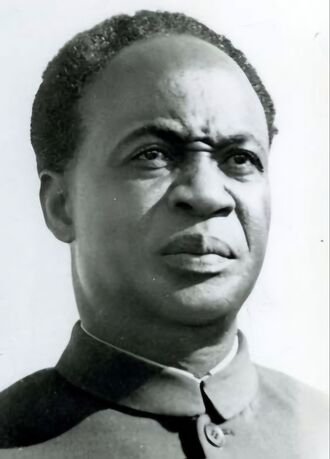Kwame Nkrumah
Kwame Nkrumah (21 September 1909 – 27 April 1972) was a Ghanaian politician, political theorist, and revolutionary. He was the first Prime Minister and President of Ghana, having led the Gold Coast to independence from Britain in 1957.

|
| “ | Just as in the days of the Egyptians, so today God had ordained that certain among the African race should journey westwards to equip themselves with knowledge and experience for the day when they would be called upon to return to their motherland and to use the learning they had acquired to help improve the lot of their brethren. ...I had not realized at the time that I would contribute so much towards the fulfillment of this prophecy. | „ |
| ~ Excerpt from Nkrumah's autobiography. |
An influential advocate of Pan-Africanism, Nkrumah was a founding member of the Organization of African Unity and winner of the Lenin Peace Prize from the Soviet Union in 1962.
Biography edit
Nkrumah was born on September 21, 1909, in Nkroful, Gold Coast. The son of a goldsmith, he attended mission schools at Accra and government training colleges at Achimota (1926-1930) where he prepared to be a teacher.
In 1935, Nkrumah left for the United States where he attended Lincoln University (1935-1939) and the University of Pennsylvania (1939-1943). A gifted student, by 1943 Nkrumah had earned multiple bachelor’s and master’s degrees in economics, sociology, education, theology, and philosophy. Then, in May of 1945, Nkrumah departed for London, England, where he studied as a Ph.D. student at the London School of Economics. While in London, Nkrumah held key positions in anti-colonialist and Black-nationalist organizations and authored controversial papers calling for African independence and unity. In 1945, Nkrumah co-founded the Pan African Congress, which became an influential voice against colonialism in Africa.
In 1947, Nkrumah returned to the Gold Coast and became general secretary of the newly-founded United Gold Coast Convention. However, in 1949 Nkrumah split with the organization over its political objectives and formed the Convention People’s Party (CPP). During his tenure as head of the CPP, Nkrumah protested British rule and led numerous petitions for self-government. Imprisoned by the British in 1950 for his political activities, Nkrumah was released in 1951 when his party won the general election in a landslide victory. He subsequently was elected prime minister in 1952.
As prime minister, Nkrumah led an aggressive campaign for independence and achieved it in 1957. Three years later, he formed a new government, the Republic of Ghana. A devoted Pan-Africanist, Nkrumah forged alliances with both Guinea and Mali and sought to create a league of African states with its own government. To help achieve this goal, in 1963 he and other African leaders formed the Organization of African Unity. Choosing to remain neutral in political affairs outside of the African continent, Nkrumah initially gained tentative support from both the United States and the Soviet Union, receiving economic and technical aid from both countries.
Vigorously suppressing political dissidents, Nkrumah almost immediately was branded a dictator by his political opponents. Then, in 1961 a firestorm of protest erupted after he appointed himself supreme commander of the armed forces and absolute head of the CPP. Nkrumah subsequently outlawed all other political parties.
In 1966, Nkrumah’s government was overthrown by a coup d’état while he was on a trip to Beijing, China. Taking refuge in Guinea, Nkrumah spent the rest of his life in exile. He died in Bucharest, Romania on April 27, 1972.
